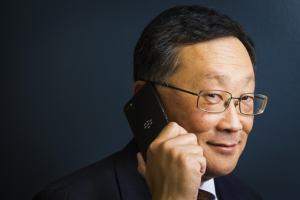It's game over for BlackBerry as it succumbs to smartphone giants Apple and Samsung. The company is about to launch its last smartphone, and will instead focus on developing back-end mobile security software work.
BlackBerry, sticking to tradition, will release its last mobile phone with a keyboard that is typical of the company's phone range.
BlackBerry CEO John Chen confirmed of the company's new plans in a recent interview with Bloomberg.
Last summer, BlackBerry announced that it is releasing its last touchscreen phone, named DTEK50. It will also have been its last mobile phone device.
However, due to demand, the company decided that it will continue to release its keyboard phones with tie-ups from manufacturers. Rights will only be released, and the company will no longer be manufacturing their own phones.
Priv is the last BlackBerry keyboard-equipped mobile phone fully manufactured and released by the company. However, it didn't catch with the smartphone trend and it failed considerably in trying to keep the BlackBerry brand in tow.
Priv was built with an Android operating system. The company hasn't released a statement just yet whether the upcoming keyboard device will be running on Android or BlackBerry OS 10. No other details have been released for the upcoming device.
It is discouraging for technology analysts to know that BlackBerry Classic, which was once heralded as the go-to mobile phone for executives, government staff and police detectives, has also succumbed to the smartphone trend.
As telecommunications analyst Jeff Kagan says, "Everyone expected BlackBerry to fade off into the sunset on the handset side of the business." But he is quick to add a gleam of hope, "However, (we know) BlackBerry is going to be focused on working with other handset makers with their technology inside."
Some analysts believe it is BlackBerry's mobile keyboard niche that's been unable to keep up with consumers' needs. Unlike Samsung, Apple and Google, the three smartphone giants are able to innovate because of the open-ended system each company has laid out for all their devices.
However, it is this niche that analysts say BlackBerry should work very hard on. "There are executives and others who like the physical keyboard, and if BlackBerry can make a case that they can fill this need, then they can have a small part of the market," says William Stofega, International Data Corporation (IDC) Program Director.
Some have also applauded BlackBerry's move to outsource their manufacturing, as doing so keeps the costs and risks low. As to this decision, Steve Blum of Tellus Venture Associates says, "Assuming they're (BlackBerry) contracting out manufacturing and they have a reasonably accurate sales forecast, there's no reason not to keep targeting their legacy market, so long as it's at least minimally profitable."

















